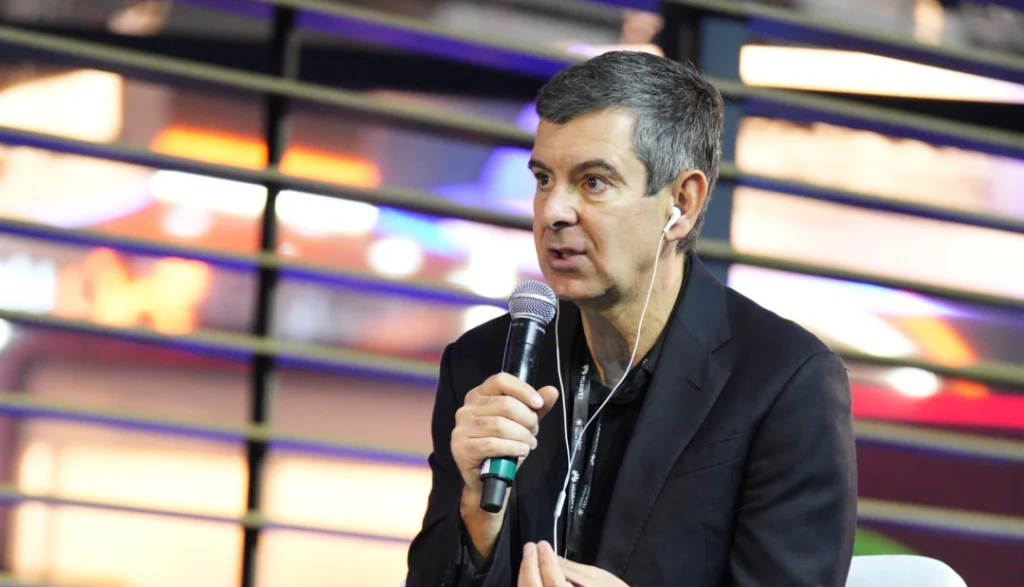We have reached day two of Febraban Tech 2023, the largest technology and innovation event for businesses in the financial sector in Latin America. Wednesday (28) was marked by increased booth activity and a diverse range of topics explored in all the event’s auditoriums.
However, two themes were pervasive and recurrent in the panels: artificial intelligence and customer-centricity.
The journey to data maturity in organizations
Artificial Intelligence is set to play a pivotal role in driving transformative changes within the financial sector. However, for organizations to fully realize AI’s potential, they must first understand the business challenges they want to tackle through AI. Prioritizing the advancement of data maturity is paramount to achieving their desired business objectives. This critical aspect took center stage during a talk by Filipe Barretto, Cloud Sales Leader at e-Core, at the e-Core/AWS booth.
Filipe showcased cases where Artificial Intelligence facilitated significant transformations for businesses in the financial sector, going beyond mere hype. One of the cases presented featured Concil, a Brazilian company responsible for budgeting car repairs for insurers. The company implemented a budgeting process without human intervention utilizing an Artificial Intelligence model after managing their data infrastructure through cloud environments provided by e-Core. This initiative led to a remarkable 300% growth in car repairs within just a year.
Filipe also introduced the Gartner model, which offers a comprehensive framework for evaluating an organization’s position on the data maturity journey. He outlined the steps that can be undertaken at each stage of the data maturity journey, starting from the foundational level and advancing through five progressive stages until the transformational model is reached.
Towards the end of the talk, Neilton Rocha, CTO of the Brazilian fintech a55, shed light on the benefits derived from embracing a new architecture built upon implementing the Well-Architected Framework by e-Core. He highlighted how this strategic decision has significantly enhanced resource efficiency in the cloud, bolstering the fintech’s operations.

Banking CIOs: Technology, Business, and AI
The first session of the day brought together CIOs from major Latin American banks to discuss the intersection of technology and business. Edilson Reis, CIO and Executive Director of the financial services company Bradesco emphasized that the bank’s employees not only welcome but also expect the proximity between technology and business.
“We conducted an internal survey within the bank to understand what people expected from the technology department. The answers highlighted the importance of agility and close collaboration. This mindset is reflected in our multidisciplinary teams. I take great pleasure in attending meetings where it’s difficult to discern which individuals represent the technology, business, or customer experience departments because everyone is working together with a shared focus on customer-centricity,” said Reis.
Team synergy brings several advantages, including greater efficiency in adopting new tools and methodologies across various departments and leveraging the experiences of other sectors, said Christian Flemming from the investment bank BTG Pactual. “For instance, all our efforts to create a digital bank for retail didn’t go unnoticed. Our wealth management area utilized everything we developed for retail,” he explained.
Artificial Intelligence was a prominent topic discussed by the CIOs. They unanimously recognized that the advent of generative AI and the rapid adoption of ChatGPT represent a moment of large-scale transformation in the digital ecosystem.

“Throughout my career, I cannot recall witnessing an innovation that garnered such widespread engagement and demand as generative AI. Typically, we have to persuade other departments to embrace new technologies. However, with ChatGPT, everyone quickly understood the technology and made immediate connections to its applications. I have witnessed numerous instances where we didn’t need to initiate the conversation; the interest was already there. Nonetheless, this doesn’t diminish our capacity to delve into the technology and propose alternative uses that may not be immediately apparent,” said Ricardo Guerra, CIO of the financial services company Itaú Unibanco.
Despite some uncertainties regarding the long-term role of AI in the financial sector, beneficial changes can be anticipated not only for customers and users but also for banks.

“The more our customers stay connected, embracing digital platforms and actively consuming data within this ecosystem, the greater the potential for leveraging AI. The primary focus should always be on enhancing customer relationships and enabling hyper-personalization, expanding the boundaries of the value we traditionally provide through digital services,” said Adriana Salgueiro, VP of Technology and Digital at Caixa, a state-owned Brazilian financial services company.






